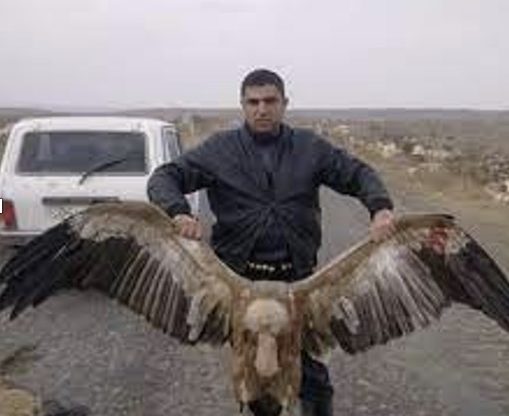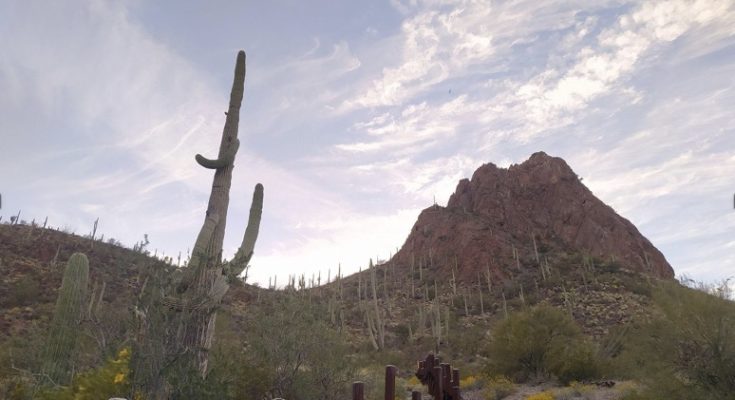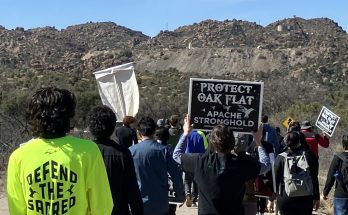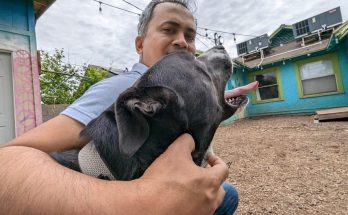Behind the US-Mexico border barriers in the South of Arizona, human tragedy is strewn on the ground. Within every fifty-meter radius, winter gloves, linen, water bottles, and medication packs are scattered. It appears people are literally fighting a life-and-death battle with heat and cold, with nature and the government, to achieve their future dreams or perhaps just to save their present lives.
Verlon Jose, a representative of the Tohona
O’odham Native Nation on the border, shows the vehicle
barrier built in the 1990s and expresses how offensive and
harmful it is to his people who live on both sides of the
border. “This border is an invisible line for us; we
will never recognize any barriers,” he says.
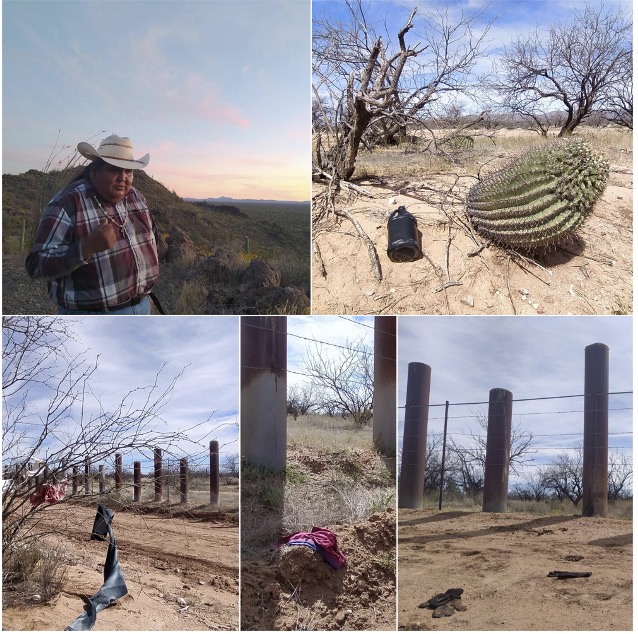
The vast US-Mexico border is familiar to the average
non-American from Hollywood movies and former President
Trump’s “wall campaign.” In fact, the
walls here started going up decades before Trump and
continue to go up after Trump. There is different
infrastructure in different areas: five-meter iron poles,
short poles and barbed wire, concrete walls, and so on. In
the fall of 2022, Arizona’s former governor Doug Ducey
initiated the “filling in” of the
“missing” sections of the wall by using shipping
containers as a wall. Of course, due to the emergence of
“legal and political new circumstances,” and
thanks to civil resistance, the Ducey wall was dismantled,
but the border problem is far from being solved. Now with my
classmates Trilce from Mexico, and Makepeace from India, I
am making a documentary about the Container wall and its
impact on nature and the people. For us, the film’s
authors, this issue also has a personal context.
More than 80 percent of my home country,
Armenia’s 1,440-kilometer border, is closed today. In
the west, there are barbed wires on the border with Turkey,
and in the east, there is a dense military infrastructure in
addition to deadly trenches on the border with Azerbaijan.
“-
Wind of the mountains, where do you come from?
And
where are you in a hurry?
Anxious and sad –
Wind
of my mountains!“
An excerpt from the famous Armenian song. In
this song, a descendant of the Medz Yeghern – the
Armenian Genocide survivors, talks to the restless wind.
“-
I come from far away
Ruined from your homeland,
That
I will take your longing to those mountains
Which you
left on the other side of the river,”
the wind answers.
Almost every third Armenian living in the country today is a descendant of a genocide survivor. And the number of people living in the Armenian diaspora is nearly three times greater than the number of people living in the homeland.
In 387 AD, the Armenian people were, for the first time, divided between two regional powers, Rome and Persia. After that, there were the Dark Middle Ages. Then, at the beginning of the bright twentieth century, Armenia was again divided between two empires, Russia and Turkey. And one of them, Turkey, reasoned that in WWI, “its” Armenians supported its opponent, the Entente, which was the alliance of Russia, France, and the UK, displaced and destroyed almost the entire Armenian population of the empire. 1.5 million people were killed, and almost as many were deported and deprived of their homes, property, and from their cultural heritage. The Genocide started 108 years ago – in April 1915.
The Turkish government today denies the Metz Yeghern
implying that “it is normal for people to die during
the war.” In response to the international pressure to
recognize the genocide, the autocratic leader of the
country, Recep Erdogan, retorts, “It’s better to
look at the black pages of your own history,”
referring primarily to the genocidal actions committed by
the US against Native Americans.
It seems that the Turkish leader is quoting an iron
argument. Indeed, any successful modern country, especially
the great powers that benefited from the colonial past until
now, has a “genocidal skeleton” in their
“closets” of history. However, the question
today is, to what extent are nations able to reflect on
their past, accept mistakes and try to mitigate the
consequences of irreparable losses?
Living in the United States for the Humphrey
fellowship has exposed me to how the US government and the
American people today are trying to face the shameful pages
of history: various privileges are given to indigenous
peoples, there are museums to admit and share the history
and education programs about indigenous language and culture
are included in the school curriculum. Verlon Jose says that
his nation’s youth have a better command of the
O’odham language than his generation.
On the
other side, the Turkish government is encouraging
nationalist groups to glorify the organizers of the Armenian
Genocide.
In the photo below are personal items of the
“Turkish Hitler” – Talaat Pasha, the main
organizer of Metz Yeghern, exhibited in a museum in
Istanbul. Also, streets and other public facilities are
named after him.
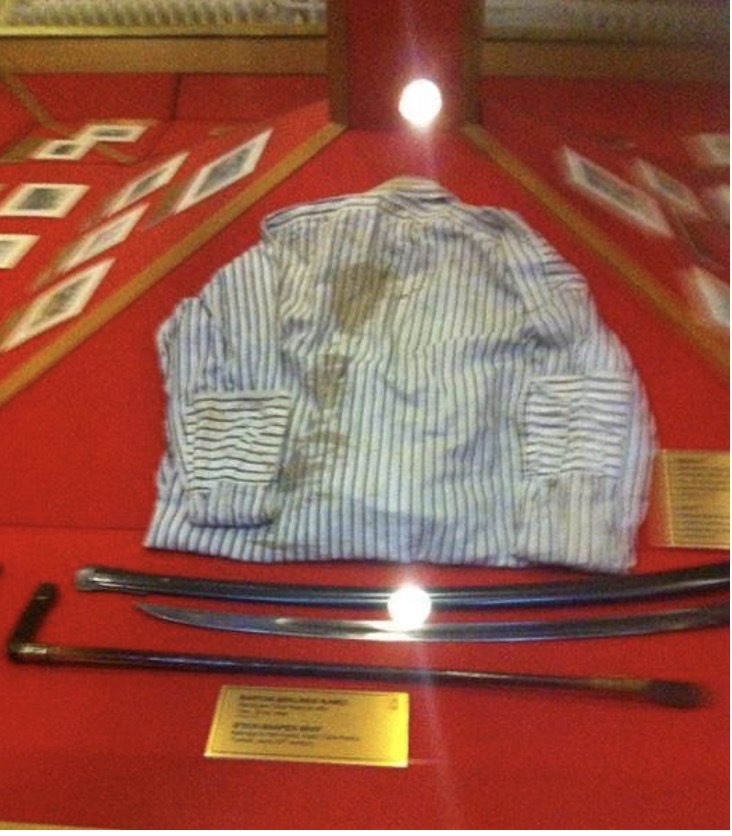
Turkey not only denies the Armenian genocide. It also keeps the border with Armenia closed to this day, arguing in particular that there is a clause in Armenia’s Declaration of Independence to eliminate the consequences of that tragedy. With this in place, descendants of the genocide survivors see no chance to one day return and live in the land of their ancestors. Such situations affect people and societies: closed physical borders deepen the gap in the souls of people and Nations.
I want to end this blog by highlighting the comment by
Russ McSpadden, an environmental activist featured in our
film on the border wall. He said: “There are no
Mexican and American bears, they are the inhabitants of this
area, and they should have the opportunity to move!”
This reminded me of a ridiculous and sad story that happened
in Armenia years ago. A resident of one of the villages
bordering Turkey killed a white vulture – a bird
registered in the Red Book- and proudly shared a photo with
the bird on social networks, which was picked by traditional
media.llllĺ Responding to the public indignation caused by
his act, the poacher said, “Relax, folks, that bird
came from Turkey; it was not Armenian!”
In any case, poaching carries a criminal penalty, and
that guy suffered the consequences of what he did.
